News & Media
June, 2019
Shift
Applied Cognition Lab Wins 2019 SHIFT Award
The SHIFT Awards recognize individuals, initiatives, or organizations that make innovative, impactful and replicable contributions to conservation and/or public health through outdoor recreation—part of SHIFT’s commitment to showcasing on-the-ground work that is successfully meeting challenges at the nexus of outdoor recreation, conservation and public health in communities around the country.

October, 2017
KSL News
Infotainment systems too distracting to drivers, new U. research shows
All the new technology being installed in cars these days is adding up to more and more distractions for drivers. A study by AAA found people taking their eyes off the road for 40 seconds at a time. NBC’s Tom Costello reports for TODAY.
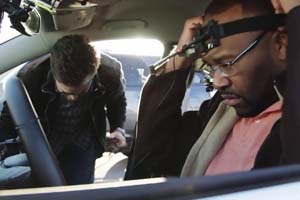
October, 2017
Salt Lake Tribune
Utah study: New car 'infotainment' often too dangerous to safely use
Systems are far more distracting than cellphone use or even texting while driving.
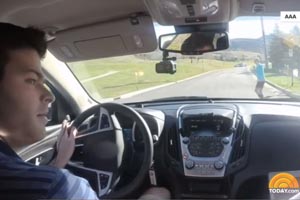
October, 2017
NBC Today
In-vehicle tech dangerously distracts drivers, new study shows
All the new technology being installed in cars these days is adding up to more and more distractions for drivers. A study by AAA found people taking their eyes off the road for 40 seconds at a time. NBC’s Tom Costello reports for TODAY.
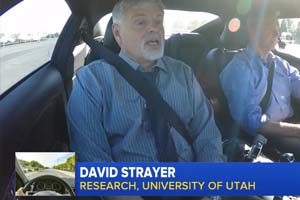
October, 2017
ABC News
Infotainment increases distracted driving: Study
Systems used to navigate texts and tune your radio may take your eyes and attention off the road for dangerous amounts of time.

January, 2016
National Geographic Magazine
This Is Your Brain on Nature
When we get closer to nature—be it untouched wilderness or a backyard tree—we do our overstressed brains a favor.
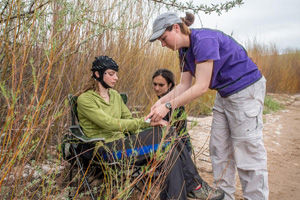
April 21, 2016
Deseret News
How your mind rejuvenates itself
A stone's throw from bluffs peppered with ancient Anasazi petroglyphs, the river flows smooth and fast along a reed-covered bank shaded by willows. Students with EEG caps wander from a tent through the reeds to a sandy river bank, where they will meditate while laptops record their brain activity.
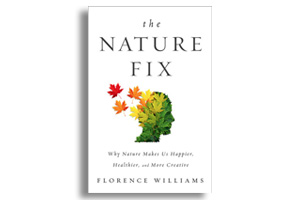
2016
Florence Williams Blog
The Nature Fix: Why Nature Makes Us Happier, Healthier, And More Creative
For centuries, poets and philosophers extolled the benefits of a walk in the woods: Beethoven drew inspiration from rocks and trees; Wordsworth composed while tromping over the heath; Nikola Tesla conceived the electric motor while visiting a park. Intrigued by our storied renewal in the natural world, Florence Williams sets out to uncover the science behind nature’s positive effects on the brain.

January 10, 2016
National Geographic Channel
Explorer: Call Of The Wild
More than half the world lives in urban environments, but some people are reaching back to the land and carving out lives in the wilderness.

May 7, 2014
The New Yorker
Multitask Masters
In 2012, David Strayer found himself in a research lab, on the outskirts of London, observing something he hadn’t thought possible: extraordinary multitasking. For his entire career, Strayer, a professor of psychology at the University of Utah, had been studying attention—how it works and how it doesn’t. Methods had come and gone, theories had replaced theories, but one constant remained: humans couldn’t multitask.
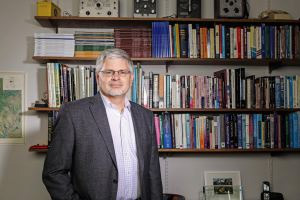
December 8, 2014
People Behind the Science Podcast
Steering Our Attention Towards Issues in Distracted Driving
In each episode, a different scientist will guide us through their journey by sharing their successes, failures, and passions. We are excited to introduce you to these inspiring academic and industry experts from all fields of science to give you a variety of perspectives on the life and path of a scientist. In the lab, Dr. David Strayer does applied cognitive neuroscience to understand how attention works in everyday life. His lab studies how people do more than one thing at a time (multitasking), like driving and talking on a cell phone.
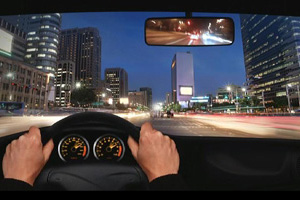
January 15, 2010
Oprah.com
Distracted Driving: What You Don't See
Think you can drive and text or talk at the same time? Science shows your brain just can't keep up. University of Utah researcher David Strayer has been studying distracted drivers for 10 years. "The brain just doesn't work the way we'd like it to work," he says. "We can't multitask the way that a lot of people think they can."

March 18, 2016
Outside Magazine
The New Science of the Creative Brain on Nature
Beautiful vistas and outdoor fun impact your brain in real ways, and the latest research is finally cracking exactly how—which means you're just trails away from becoming a better thinker

August 15, 2010
New York Times
Your Brain On Computers: Outdoors and Out of Reach, Studying the Brain
For the first time in three days in the wilderness, Mr. Braver is not wearing his watch. “I forgot,” he says. It is a small thing, the kind of change many vacationers notice in themselves as they unwind and lose track of time. But for Mr. Braver and his companions, these moments lead to a question: What is happening to our brains?
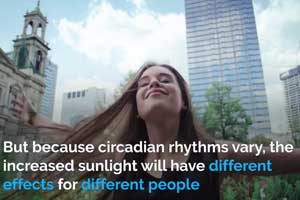
February 07, 2017
Time Magazine
How Just 15 Minutes in Nature Can Make You Happier
Modern Americans have inherited Romantic notions of nature. We too seek out the sublimity of ocean views and majestic peaks. I spent much of my twenties and thirties living in Colorado and Montana, playing on the dramatic slopes and in the clear rivers of the Rockies. My daily dose of nature was framed by champagne powder, mountain bluebirds and unpeopled ribbons of trails. I was spoiled.

December 13, 2012
NPR
Ah, Wilderness! Nature Hike Could Unlock Your Imagination
Want to be more creative? Drop that iPad and head to the great outdoors. That's the word from David Strayer, a cognitive neuroscientist who studies multitasking at the University of Utah. He knew that every time he went into the southern Utah desert, far from cellular service, he started to think more clearly.

2016
Association of Nature & Forest Therapy
Brief introduction to the science of Forest Therapy: a curated collection of journalism and research
Physical activity in the from of a 40 minute walk in the forest was associated with improved mood and feelings of health and robustness. Levels of the stress hormone cortisol decreased in test subjects after a walk in the forest, when compared with a control group of subjects who engaged in walks within a laboratory setting.
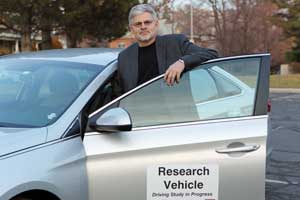
Oct 22, 2015
University of Utah UNews
Up To 27 Seconds Of Inattention After Talking To Your Car Or Smartphone
If you think it is okay to talk to your car infotainment system or smartphone while driving or even when stopped at a red light, think again. It takes up to 27 seconds to regain full attention after issuing voice commands, University of Utah researchers found in a pair of new studies for the AAA Foundation for Traffic Safety.
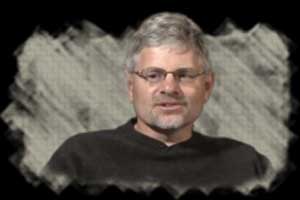
Go Cognitive
David Strayer - Driver Distraction
Dr. David Strayer is a cognitive psychologist at the University of Utah who has investigated the effects of distraction on performance in numerous studies. His research has clearly shown the large cost of common distractions - like cell phone use and texting - on driving performance. Talking on the cell-phone increases the risk of accidents fourfold - the same amount as driving while intoxicated above the legal limit.
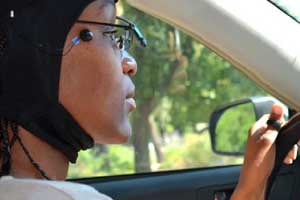
June 12, 2013
Salt Lake Tribune
Utah researcher: Car voice commands more distracting than mobile phones
Big engines and cushy seats are not enough for today's automobile buyers. They want cars fused with computers. Machines that respond to their voice. Access to the Web while changing lanes. Automakers are responding, but these latest "infotainment" features may be more fun than safe.

OCT. 22, 2015
New York Times
Cars’ Voice-Activated Systems Distract Drivers, Study Finds
When driving, don’t talk to your car — or your phone. That’s the underlying message of new neuroscience published Thursday that raises new questions about the safety of voice-activated technology in many new cars. The technology, heralded by many automakers, allows consumers to interact with their phones and their cars by issuing voice commands, rather than pushing buttons on the dashboard or phone. But the research (and an accompanying video) shows that the technology can be a powerful distraction, and a lingering one.
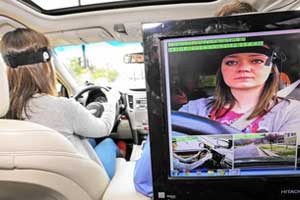
October 7, 2014
Los Angeles Times
Auto phone systems, Apple Siri distract drivers, studies say
In many cars, making a hands-free phone call can be more distracting than picking up your phone, according to a new study from AAA and the University of Utah. In-dash phone systems are overly complicated and prone to errors, the study found, and the same is true for voice-activated functions for music and navigation.

Car Talk
Why it Matters
Driver distraction is the cause of at least one out of every three accidents and fatalities on the roadway. That translates into thousands of deaths and injuries every year. Each is entirely preventable. Over the years, I've met several families who have lost a loved one due to distracted driving. They make a convincing argument that no cell phone conversation is worth the life of their child, spouse, parent, or friend. Can anyone really argue otherwise?


